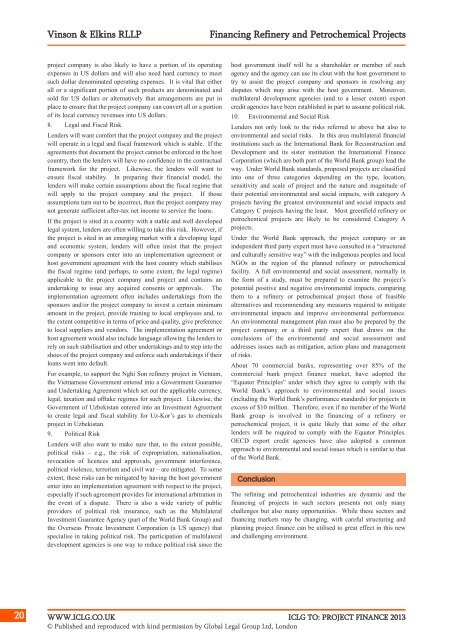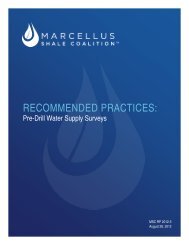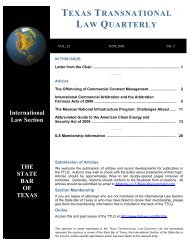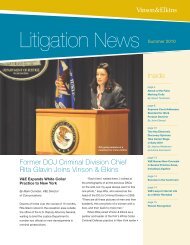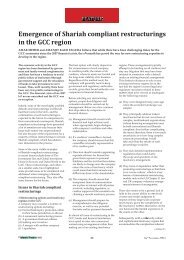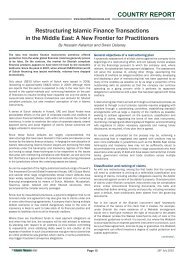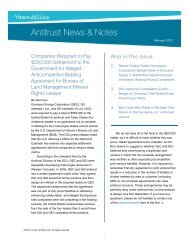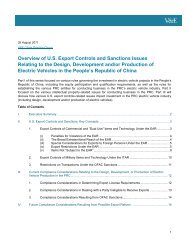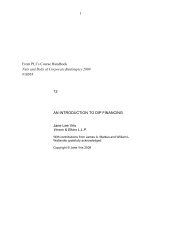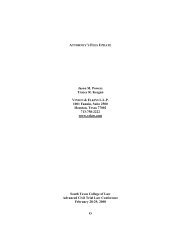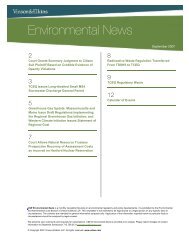<strong>Vinson</strong> & <strong>Elkins</strong> R<strong>LLP</strong>Financing Refinery and Petrochemical Projectssponsor(s) of such project. T<strong>here</strong>fore, potential lenders willconduct extensive due diligence on any refining or petrochemicalproject to ensure that all relevant risks have been identified andaddressed. The following is a non-exhaustive list of some of thekey issues which lenders to a refinery or petrochemical projectwould expect the sponsors to address.1. Completion RiskThe lenders, as well as the sponsors, will want to ensure that theproject is built on time and in accordance with the performanceparameters set out in the base case. If completion of the refinery orpetrochemical facility is significantly delayed or if such facility isunable to meet the performance standards contemplated by the basecase, then the project company may have difficulty generating thecash flow required to make principal and interest payments withrespect to the loans when due.To mitigate this risk, the lenders typically insist that the projectcompany enter into a fixed price EPC contract with a reliable,experienced and creditworthy contractor(s). Under an EPC contractfor a refinery or petrochemical project, the contractor(s) would berequired to guarantee the completion of the project by a defineddate and give certain performance guarantees, including a guaranteeof throughput, a guarantee of the slate of products the refinery orpetrochemical facility is capable of producing and a guarantee ofutility consumption. In the event that the contractor fails tocomplete the project by the required date, the EPC contract wouldprovide for the contractor to pay delay liquidated damages. In theevent that the performance falls short of the guaranteedperformance levels, the EPC Contract would provide forperformance liquidated damages to be paid by the contractor. Ineach case, t<strong>here</strong> are limits to the applicability of liquidateddamages. After an extended period of delay, delay liquidateddamages would hit their cap and the EPC contractor would face therisk of having its EPC contract terminated for its default. Similarly,performance liquidated damages only apply to limited shortfalls inperformance. Performance above a defined minimum level will bemandatory and no buydown by the EPC contractor would apply tosuch shortfalls.As mentioned above, the lenders will also require that the sponsorsprovide a completion guarantee or some other form of completionsupport until project completion is achieved. In our experience, theweaker the sponsor completion support, the more robust the transferof risk onto the contractor under the EPC contract needs to be.2. Technology RiskLenders will want to ensure that the refinery or petrochemicalfacility uses process technology which has been tested and provenon a commercial scale, and generally at the scale of the project inquestion. This is not typically an issue for a refinery project sincemost of the processing methods currently used in the refiningindustry have been in commercial use for several decades.Occasionally this has been an issue for petrochemical projects. Forexample, a certain gas to liquids project experienced difficulty inachieving the performance levels required to satisfy the lender’sProject Completion test and was ultimately unable to satisfy suchtest. It is essential that the project company enter into a licensingand technology transfer agreement with one the leading licensors ofsuch technology. Track record of licensors and their technology isparticularly important as the license and technology transferagreement customarily are subject to limited recourse against thelicensors and have low relative caps on liability when compared tothe damage to a project caused by failed process technology. At thesponsor and lender level, this risk can sometimes be mitigated bywrapping the process technology risk within the contractor’sresponsibility under the EPC contract.3. General Operating RiskAs oil refining and petrochemical production are very specialisedindustries, the lenders will want to ensure that the project companyhas the ability to properly operate and maintain the refinery orpetrochemical facility once it has been completed. As projectcompanies are generally special purpose companies with no priorhistory, the sponsors need to demonstrate that it will have suchexpertise in time for relevant training and commencement ofoperations. If the sponsors cannot demonstrate that the projectcompany will have such capability in time, the lenders will requirethe project company to enter into an operation and maintenanceagreement with an experienced third party operator w<strong>here</strong>by suchthird party agrees to perform the operation and maintenance of thefacility. It is not uncommon for lenders to encourage sponsorswithout a track record in operations to form a joint venture with acompany with substantial experience in the relevant industry.4. Feedstock Supply RiskLenders will want to ensure that the project company enters intolong-term feedstock supply agreements with reliable suppliers offeedstock. The arrangements will differ depending on the how thefeedstock is to be delivered (pipeline or tanker) and the flexibilityof the facility to process different feedstock. For example, aninland petrochemicals project which relies on gas delivered bypipeline will have more onerous supply guarantees than a seaboardrefinery with its own jetty which can process a wide variety ofcrudes. In any event, what the lenders will want to see is certaintyof supply. While they may be willing to accept market pricing, theyare less willing to take a risk on feedstock volume. As such,feedstock supply agreements generally impose deliver or payobligations on the supplier so that liquidated damages are levied ift<strong>here</strong> is a failure to deliver. The term of the feedstock supplycontracts are customarily a few years longer than the final loanmaturity date under the loan facilities.5. Market RiskLenders will want to ensure that t<strong>here</strong> is a robust market for theproduct slate to be produced by the facility. Lenders generally seekthe advice of a market consultant to evaluate and opine on thestrength of the market and the project company’s marketingstrategy. Even w<strong>here</strong> the market is generally robust, the lenderswill likely require the project company to enter into long termofftake contracts for some or all its products with creditworthyofftakers. Similar to the supply side, the lenders will want to ensurethat the offtakers comply with the terms of the offtake agreementsand will t<strong>here</strong>fore expect to see take or pay obligations in eachofftake contract. The term of the offtake contracts is customarily afew years longer than the final maturity date under the loanfacilities.6. Price RiskAs the purchase price for hydrocarbon feedstock and as the saleprice for products are likely to be determined under the relevantcontracts by reference to a market price, the lenders will want toensure that the margin between the two sets of prices is likely to besufficiently large to ensure that the refinery or petrochemicalfacility will generate enough cash flow to service their loans, aswell as to pay dividends to the sponsors. In conducting suchanalysis, the lenders will look not only to the pricing formulas setout in the feedstock supply and product sale agreements, but willalso look at historic and projected global and regional margins forthe products in question.7. Currency RiskAs the lenders are likely to denominate and disburse their loans inUS dollars, the lenders will want to make sure that the projectcompany has access to hard currency to service its loans. TheICLG TO: PROJECT FINANCE 2013© Published and reproduced with kind permission by Global Legal Group Ltd, LondonWWW.ICLG.CO.UK19
<strong>Vinson</strong> & <strong>Elkins</strong> R<strong>LLP</strong>Financing Refinery and Petrochemical Projectsproject company is also likely to have a portion of its operatingexpenses in US dollars and will also need hard currency to meetsuch dollar denominated operating expenses. It is vital that eitherall or a significant portion of such products are denominated andsold for US dollars or alternatively that arrangements are put inplace to ensure that the project company can convert all or a portionof its local currency revenues into US dollars.8. Legal and Fiscal RiskLenders will want comfort that the project company and the projectwill operate in a legal and fiscal framework which is stable. If theagreements that document the project cannot be enforced in the hostcountry, then the lenders will have no confidence in the contractualframework for the project. Likewise, the lenders will want toensure fiscal stability. In preparing their financial model, thelenders will make certain assumptions about the fiscal regime thatwill apply to the project company and the project. If thoseassumptions turn out to be incorrect, then the project company maynot generate sufficient after-tax net income to service the loans.If the project is sited in a country with a stable and well developedlegal system, lenders are often willing to take this risk. However, ifthe project is sited in an emerging market with a developing legaland economic system, lenders will often insist that the projectcompany or sponsors enter into an implementation agreement orhost government agreement with the host country which stabilisesthe fiscal regime (and perhaps, to some extent, the legal regime)applicable to the project company and project and contains anundertaking to issue any acquired consents or approvals. Theimplementation agreement often includes undertakings from thesponsors and/or the project company to invest a certain minimumamount in the project, provide training to local employees and, tothe extent competitive in terms of price and quality, give preferenceto local suppliers and vendors. The implementation agreement orhost agreement would also include language allowing the lenders torely on such stabilisation and other undertakings and to step into theshoes of the project company and enforce such undertakings if theirloans went into default.For example, to support the Nghi Son refinery project in Vietnam,the Vietnamese Government entered into a Government Guaranteeand Undertaking Agreement which set out the applicable currency,legal, taxation and offtake regimes for such project. Likewise, theGovernment of Uzbekistan entered into an Investment Agreementto create legal and fiscal stability for Uz-Kor’s gas to chemicalsproject in Uzbekistan.9. Political RiskLenders will also want to make sure that, to the extent possible,political risks – e.g., the risk of expropriation, nationalisation,revocation of licences and approvals, government interference,political violence, terrorism and civil war – are mitigated. To someextent, these risks can be mitigated by having the host governmententer into an implementation agreement with respect to the project,especially if such agreement provides for international arbitration inthe event of a dispute. T<strong>here</strong> is also a wide variety of publicproviders of political risk insurance, such as the MultilateralInvestment Guarantee Agency (part of the World Bank Group) andthe Overseas Private Investment Corporation (a US agency) thatspecialise in taking political risk. The participation of multilateraldevelopment agencies is one way to reduce political risk since thehost government itself will be a shareholder or member of suchagency and the agency can use its clout with the host government totry to assist the project company and sponsors in resolving anydisputes which may arise with the host government. Moreover,multilateral development agencies (and to a lesser extent) exportcredit agencies have been established in part to assume political risk.10. Environmental and Social RiskLenders not only look to the risks referred to above but also toenvironmental and social risks. In this area multilateral financialinstitutions such as the International Bank for Reconstruction andDevelopment and its sister institution the International FinanceCorporation (which are both part of the World Bank group) lead theway. Under World Bank standards, proposed projects are classifiedinto one of three categories depending on the type, location,sensitivity and scale of project and the nature and magnitude oftheir potential environmental and social impacts, with category Aprojects having the greatest environmental and social impacts andCategory C projects having the least. Most greenfield refinery orpetrochemical projects are likely to be considered Category Aprojects.Under the World Bank approach, the project company or anindependent third party expert must have consulted in a “structuredand culturally sensitive way” with the indigenous peoples and localNGOs in the region of the planned refinery or petrochemicalfacility. A full environmental and social assessment, normally inthe form of a study, must be prepared to examine the project’spotential positive and negative environmental impacts, comparingthem to a refinery or petrochemical project those of feasiblealternatives and recommending any measures required to mitigateenvironmental impacts and improve environmental performance.An environmental management plan must also be prepared by theproject company or a third party expert that draws on theconclusions of the environmental and social assessment andaddresses issues such as mitigation, action plans and managementof risks.About 70 commercial banks, representing over 85% of thecommercial bank project finance market, have adopted the“Equator Principles” under which they agree to comply with theWorld Bank’s approach to environmental and social issues(including the World Bank’s performance standards) for projects inexcess of $10 million. T<strong>here</strong>fore, even if no member of the WorldBank group is involved in the financing of a refinery orpetrochemical project, it is quite likely that some of the otherlenders will be required to comply with the Equator Principles.OECD export credit agencies have also adopted a commonapproach to environmental and social issues which is similar to thatof the World Bank.ConclusionThe refining and petrochemical industries are dynamic and thefinancing of projects in such sectors presents not only manychallenges but also many opportunities. While these sectors andfinancing markets may be changing, with careful structuring andplanning project finance can be utilised to great effect in this newand challenging environment.20WWW.ICLG.CO.UKICLG TO: PROJECT FINANCE 2013© Published and reproduced with kind permission by Global Legal Group Ltd, London


